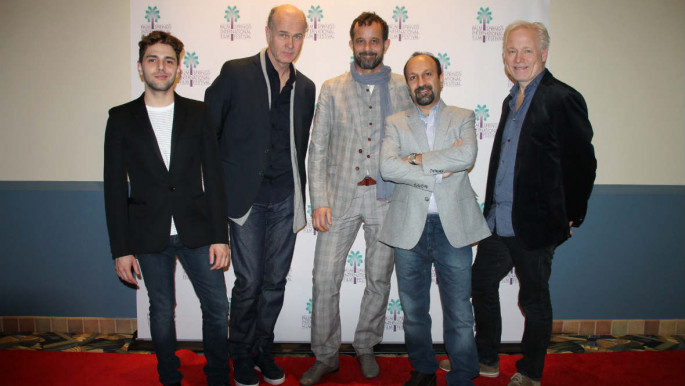Palm Springs presents cinema a world away from Hollywood
But rather than hordes of young Tunisian cinephiles, one is more likely to encounter aging Republicans, while North African states of emergency give way to Southern Californian somnambulence.
Still the filmgoers here are earnest and dedicated, and while the annual gala brings in A-list stars, the festival itself is much more about showcasing world cinema - just 100 miles from Hollywood.
The festival has a knack for predicting foreign language Oscar winners, and this year the annual Hollywood Reporter Q and A event hosted by Scott Feinberg, included several directors shortlisted for the prize; among them Xavier Dolan (of the powerful Canadian/French co-production It’s Only the End of the World); Asghar Farhadi (the Iranian director who won an Oscar in 2012 for Separation with a new film called Salesman partly inspired by the Arthur Miller play about Willy Loman - but more about the death of the Iranian dream than the American); Sweden's Hanes Holm, whose film A Man Called Ove explores the emotional awakening of a curmudgeon via his Iranian immigrant neighbour; and Norway's Erik Poppe, whose film The King's Choice examines King Haakon VII's decision to resist the Nazi invasion.
| Article continues below image |
 |
| Directors Dolan, Pappe, Barras, Farhadi and Holm hit the red carpet at the Hollywood Reporter event [Hadani Ditmars] |
With MENA films ranging from Egyptian director Mohamed Diab's production about the revolution, Clash, to Babak Anvari's Under the Shadow- a horror film set during the Iran/Iraq war in post-revolutionary Tehran - there is a wealth of regional cinema this year.
But it's the seemingly apolitical films that stand out - films where the larger situation is in the cinematic background, and where depictions of the daily life of young people offer a decidedly human dimension to regional issues.
Director Maysaloun Hamoud's In Between features strong performances from Mouna Hawa, Sana Jammelieh and Shaden Kanboura as three young Palestinian women living in Tel Aviv. The Palestinian struggle is an undercurrent - a scene early on with Jammelieh's character, Salma, has her walking out of a kitchen where she works as a chef when the Israeli manager forbids the all-Palestinian staff from speaking Arabic.
But the French-Israeli co-production focuses more on the three women's struggle to find love amid shifting political sands, presenting nuanced portrayals that defy stereotypes.
Hawa's Layla - a hard-partying criminal defence lawyer from a secular Muslim family in Nazareth - appears tough as nails as she turns down a date with a Jewish colleague on the grounds that his mother would never approve - while simultaneously negotiating a deal for her client. But her vulnerability is exposed when she falls for a young Palestinian filmmaker who studied in New York.
Jammelieh's Salma is Layla's roommate who comes from a Christian family, but must hide her lesbian identity from her parents, who force her to meet an endless succession of potential husbands.
And Kanboura's Nour is a religious Muslim student of computer science at Tel Aviv University - and an unlikely flat mate to the two.
But all is not as it seems. Layla's NYC-trained filmmaker turns out to be much less liberal than she imagined, refusing to marry her unless she - but not himself - forsakes her "Western" partying ways.
Nour's religious fiancé turns out to be a violent womanising jerk, but her traditional working class Muslim father a stand up guy and feminist in his own right.
And Salma's seemingly secular, educated Christian parents react appallingly when they discover her true nature, forcing her to live under virtual house arrest and prompting her to consider fleeing to Berlin.
In the end the characters are "in between" several worlds and realities, but are strengthened by their differences and buoyed by solidarity.
Saudi silver screen
Another film that defies stereotypes and explores the world that millennial Middle Easterners have inherited from their parents is Saudi director Mahmoud Sabbagh's delightful Barakah Meets Barakah.
This charming film, which had its US premiere at the festival, uses the medium of romantic comedy to reveal truths about Saudi society that remain hidden to most Westerners.
When Barakah - an affable municipal law enforcement officer and amateur actor from a humble background - falls for Bibi, a wealthy young Instagram star, the path to true love is laden with potential land mines.
The young lovers' efforts to circumvent strict Saudi laws prohibiting opposite-sex meetings in public without a chaperone make for some creative and ultimately frustrating scenarios.
And through young Barakah's relationship with his hard-drinking, oud-playing uncle, a rare glimpse into the secular 1960s and 1970s is revealed.
In a voice over during a memorable montage of images of mid-century Saudi mixed dancing parties, performances and schools where boys and girls studied together, young Barakah laments the loss of public life that his parents' generation enjoyed.
In the end, the film suggests that the biggest challenge to oppressive social conservatism will come from the digitally savvy millennials plugged into 21st century realities.
Meanwhile, as Trump's coming inauguration looms large beneath the desert charms of Palm Springs, the festival acts as a portal for cultural diplomacy.
As lead programmer David Ansen, former artistic director of the Los Angeles Film Festival and past Newsweek critic, says: "It’s more important than ever that people who have so many preconceptions and stereotypes about the Middle East see other points of view, to get the picture from the inside."
Follow Hadani Ditmars on Twitter: @HadaniDitmars





 Follow the Middle East's top stories in English at The New Arab on Google News
Follow the Middle East's top stories in English at The New Arab on Google News


